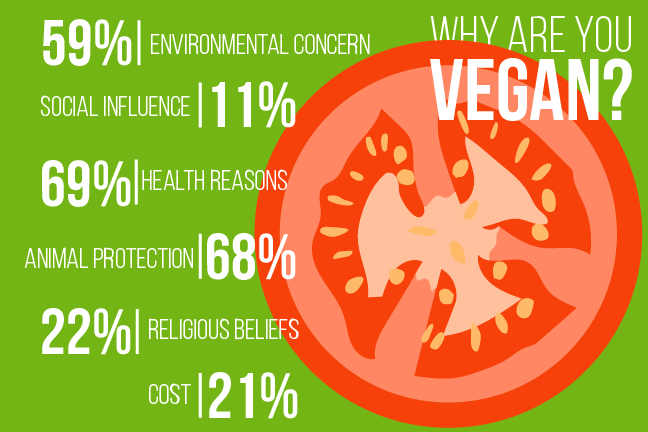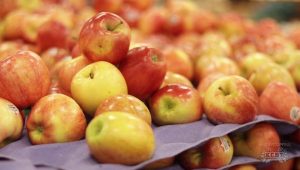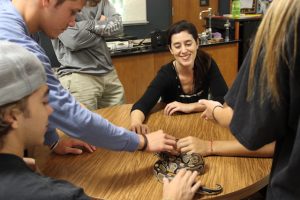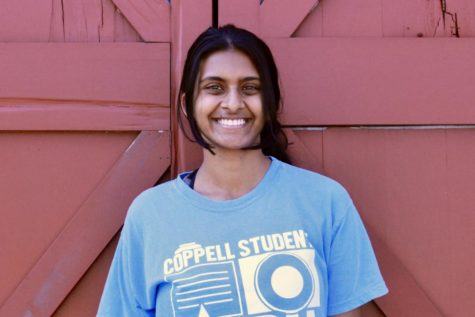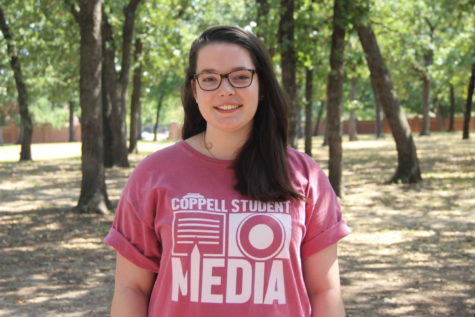Lifestyle change alters perspective for two CHS seniors
Veganism transforms lives
There are many reasons why one may make the change to a vegan lifestyle. Environmental concern, social influence, health, animal protection, religion and cost are predominant reasons in the vegan community, each at varying popularity.
December 1, 2017
Two years ago, Coppell High School seniors Giulia Carmellino and Ariana Ramirez stepped up to made a life changing decision: going vegan.
Veganism is a lifestyle prohibiting use of animal byproducts, including but not limited to meat, dairy, egg, leather and wool, as well as any product that was tested on animals. Both students agree that the benefits to animals, the environment and their own health are the three main reasons they made the change.
“I saw a documentary at school about veganism and how it could fix a lot of problems, including environmental issues,” Ramirez said. “Then, after I looked into it more, I decided going vegan was a really important thing to do.”
Cowspiracy, Earthlings and Forks Over Knives are three examples of popular documentaries that dig their way into viewers minds and refuse to leave, causing many who watch to question their views on supporting the meat, dairy and egg industries.
“A lot of people are ignorant about how cruel factory farming is,” CHS CHETA (Coppell High for the Ethical Treatment of Animals) sponsor Angela Barnes said. “Some of the video clips and documentaries about the reality of these farms are really shocking, and can have a huge impact on people.”
In the egg industry, groups of hens are generally kept in wire battery cages; each hen ends up receiving no more than a 8 ½ x 10 inch rectangle of space. Often, turkeys and chickens are bred to have such big breasts that their legs break from being unable to support the weight, because doing so is more profitable for farmers.
In the dairy industry, female cows are repeatedly abused through “rape racks”, narrow devices that restrain the cow as she is forced to be artificially impregnated, which increases the number of babies she gives birth to annually and makes her more profitable to the industry. Because of the brutal impregnating, confining and overworking of the dairy industry, dairy cows begin to have a premature reduction in the amount of milk they produce, and are then slaughtered because the industry does not see them as worth their cost anymore.
“[Veganism] is a guilt free lifestyle because no one has to get harmed to give you food,” CHS senior Erin Folk said.
Folk is not vegan herself, but she supports the cause and is thinking about going vegan in the future.
As aforementioned, cutting meat, dairy and eggs out of one’s life can also improve his or her health, which is a big reason Ramirez and Carmellino find the lifestyle attractive. In America, the average non-vegan male’s chance of heart disease is 50 percent, while the average vegan male’s chance of heart disease is only four percent.
“I’m also an athlete, and ever since I went vegan I’ve had more energy, which helps with that,” Ramirez said. “I feel healthier in general.”
Despite their love for veganism, both Ramirez and Caramellino acknowledge the difficulties that come with the lifestyle, and offer their advice regarding methods to deal with these struggles effectively.
“Sometimes I just really want to eat something with dairy in it,” Caramellino said. “But then I can just go to the store and get a vegan version of it, so it’s not that bad.”
As more and more of the world goes vegan, the number of vegan alternatives for non-vegan foods are increasing. Almond milk, daiya cheese and fake meat are common alternatives vegans enjoy, especially if they are struggling with cravings.
With only six percent of America following a vegan diet, doing so is certainly not society’s norm, which can cause complications to rise during social situations.
“Going out with friends or family to eat can be hard,” Ramirez said. “I’m Hispanic, and it can be hard for my family to adapt.”
In spite of this hardship, Ramirez’s friends and family are supportive of her choice to go vegan, and do what they can to help her follow it. Additionally, partly because of the fact that vegan food is relatively less abundant, Ramirez has began cooking food herself more often since going vegan, which has allowed her to discover how much she loves cooking.
Ramirez and Caramellino are both members of CHETA, a club at CHS that focuses on fighting for animal rights and helping environmental issues. CHETA is divided into multiple sectors, including a group that promotes veganism, a group that helps rescue animals and a group that focuses on animals in the entertainment industry and zoos.
Currently, the club members are planning a bake sale intended to raise funds for their cause.
“Being involved in CHETA lets me show how important animal rights are to me,” Caramellino said.
If one is daunted by the thought of turning vegan overnight, there are many ways to support veganism in less extreme ways.
“Try to limit your meat one day out of the week, then maybe increase that number gradually,” Caramellino said. “Also, just make people aware of why going vegan is a good idea.”
Follow Pramika @pramika_kadari



